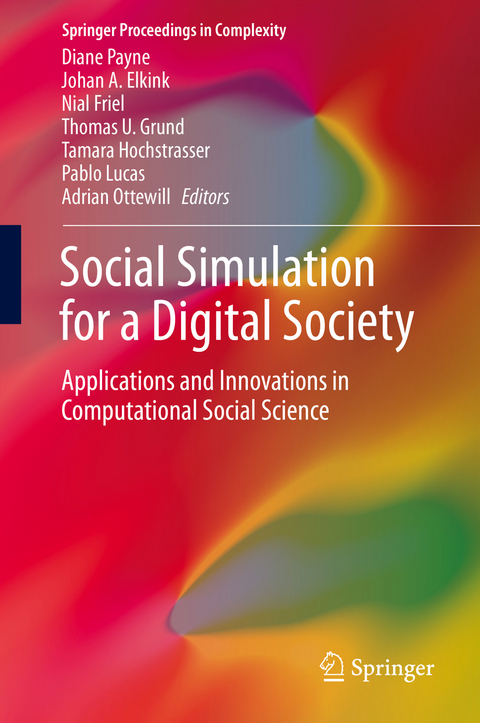
Social Simulation for a Digital Society
Springer International Publishing (Verlag)
978-3-030-30297-9 (ISBN)
Diane Payne was Associate Professor in Sociology and director of the Dynamics Lab for Computational Social Science at University College Dublin. She obtained her PhD from the University of Groningen and held positions at University of Cambridge and Trinity College Dublin before. Diane passed away in April 2019. Johan A. Elkink is Associate Professor in Social Science Research Methods at University College Dublin. He specialises in quantitative methods in political science, in particular simulation-based research and spatial econometrics. Besides applications in voting behaviour in referendums and national elections, he wrote on the international diffusion of democracy and the evolution of personalist regimes. His work appeared, among other outlets, in the Journal of Politics, Comparative Political Studies, European Journal of Political Research and Electoral Studies.
Chapter 1: Social Simulation for a Digital Society: Introduction
Philosophical and technical considerations
Chapter 2: Ontological Politics in a World of Political Ontologies: More Realistic (Human) Agents for the Anthropocene?
Chapter 3: The Art of Iterating: Update-Strategies in Agent-Based Simulation
Chapter 4: Using Parallel Computing to Improve the Scalability of Models with BDI Agents
Applications to norm diffusion and collective action
Chapter 5: Information Diffusion as a Mechanism for Natural Evolution of Social Networks
Chapter 6: Remarks on the Convergence of Opinion Formation in the Presence of Self-interest and Conformity
Chapter 7: Inequality: Driver or Inhibitor of Collective Action?
Chapter 8: The Venezuelan System of Potato Production: A Simulation Model to Understand Roots of Deficiencies
Applications in geographyand urban development
Chapter 9: Governance of Transitions: A Simulation Experiment on Urban Transportation
Chapter 10: Evaluating the Impact of an Integrated Urban Design of Transport Infrastructure and Public Space on Human Behavior and Environmental Quality: A Case Study in Beijing
Chapter 11: Prescription for Urban Sprawl: Street Activeness Changes the City
Chapter 12: The Greater Dublin Region, Ireland: Experiences in Applying Urban Modelling in Regional Planning and Engaging between Scientists and Stakeholders
Chapter 13: Synthesising the Geography of Opportunity in Rural Irish Primary Schools
Chapter 14: Modelling Collaborative Knowledge Creation Processes: An Empirical Application to the Semiconductor Industry
| Erscheinungsdatum | 05.12.2019 |
|---|---|
| Reihe/Serie | Springer Proceedings in Complexity |
| Zusatzinfo | VIII, 218 p. 58 illus., 37 illus. in color. |
| Verlagsort | Cham |
| Sprache | englisch |
| Maße | 155 x 235 mm |
| Gewicht | 499 g |
| Themenwelt | Mathematik / Informatik ► Informatik ► Theorie / Studium |
| Naturwissenschaften ► Physik / Astronomie ► Theoretische Physik | |
| Sozialwissenschaften ► Soziologie ► Empirische Sozialforschung | |
| Schlagworte | applications of social simulation • changing mobility patterns • Complexity theory • Computational Social Sciences • Data-driven Science, Modeling and Theory Building • Digital Society • dublin 2017 • methods of social simulation • Opinion Dynamics • Public Policy • simulating human interaction • Social Simulation Conference |
| ISBN-10 | 3-030-30297-0 / 3030302970 |
| ISBN-13 | 978-3-030-30297-9 / 9783030302979 |
| Zustand | Neuware |
| Informationen gemäß Produktsicherheitsverordnung (GPSR) | |
| Haben Sie eine Frage zum Produkt? |
aus dem Bereich


